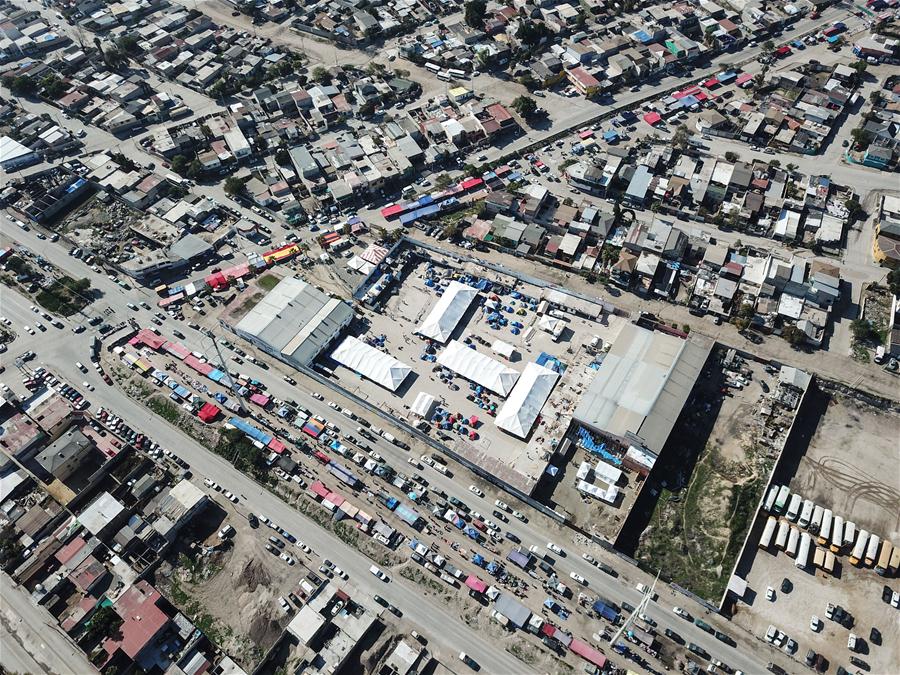
Photo taken on Jan. 10, 2019 shows El Barretal, a theater that Mexican government officials turned into a makeshift shelter to house arriving migrants in the outskirts of the border city of Tijuana, Mexico. (Xinhua/Xin Yuewei)
by Xinhua writers Cui Yuanlei, Wu Hao, Shooka Shemirani
?TIJUANA, Mexico, Jan. 13 (Xinhua) -- Maria Isabel Reyes, a Honduran mother of three, said her children provided the encouragement she needed to keep going, traveling thousands of kilometers mostly on foot across Mexico.
She was among the thousands of Central Americans who made the arduous journey in recent months as part of a series of migrant caravans headed north to the United States.
"They are warriors," said Reyes, 40, who left a job at a textile factory in Honduras to seek a safer environment for her daughters Amy, 3, Genesis, 5, and Yaritza, 20, as well as Yaritza's three-year-old girl Abis.
"'Let's continue, mummy,' they would say ... 'Let's go, mummy, don't get tired,'" recalled Reyes.
After Honduran gang members killed six of her siblings, Reyes decided to join the caravan that departed from the northern city of San Pedro Sula, her birth place, on Oct. 13.
The family has been temporarily put up at El Barretal, a theater on the outskirts of Tijuana that Mexican government officials in this border city turned into a makeshift shelter to house arriving migrants.
Tijuana sits across the border from the U.S. city of San Diego, California, where migrants hope to apply for asylum. A high metal fence separates the two cities with its west end continuing for several meters into the waters of the Pacific Ocean.
Her two youngest daughters and granddaughter spend their days doodling or playing random games with some volunteers as company in a special area, which is set up as a stopgap playland for the numerous children accompanying their parents. Genesis said she's eager to get back to school.
The family spent 45 days on the road, sometimes walking as many as eight hours a day when there were no rides available to take them from one town to the next.
"I carried one (girl) on my shoulders and the other in my arms, and that's how we came walking," said Reyes.
Like many others, the little girls got sick, catching a cold and cough. Genesis came down with chickenpox, and had a fever and a rash on her face.
During their cross-country trek they also witnessed other migrants become the victims of accidents, including falling from overcrowded trucks and getting run over.
"The road is tough. We went through long stretches of darkness that we illuminated just with our cellphones," said Reyes.
At least 1,000 of the more than 6,000 migrants that arrived in Tijuana in November last year were minors, according to the local government.
?Social workers attending to the migrant children in El Barretal say they are concerned about the effects of the journey.
Luis Guillermo Gomez, coordinator of Psychologists Without Borders in the state of Baja California, where Tijuana is located, said the children are experiencing many things at once: being uprooted, walking long distances, and sensing the uncertainty their parents face.
"These are seven-, eight- or 10-year-old children that are just getting to know the world and imagine how erratic their situation is. They come walking, they're accompanied by strangers, sometimes they leave their families behind in their country, so it is very tough," said Gomez.
His organization, which offers humanitarian psychological aid in 12 countries, and others like it are providing the children and adolescents with specialized attention to help better manage the sudden changes.
Reyes' daughters said they miss their father, who stayed behind in Honduras, as well as their toys and their home.
While the family has reached the border, it has yet to reach its goal of making it to the United States, an objective that appears to be increasingly elusive as the U.S. government cracks down on undocumented migrants.
At the end of 2018, U.S. President Donald Trump accused Honduras, Guatemala and El Salvador of not taking effective measures to discourage migrants from reaching the U.S. border. In addition to threats of cutting off aid to the mentioned countries, the U.S. side beefed up border security by sending over troops.
Fortunately for Reyes, Mexico has offered her a working permit that allows her to get a job to pay for expenses as she waits to apply for asylum.
Several hundred migrants tried to force their way across the border, but were repelled by border patrol agents. Many others accepted Mexico's offer to stay and work, or be voluntarily deported.
"When we came and saw the fence, we went to the beach. I said 'how nice, one day you are going to be over there.' You should never lose faith," said Reyes. "This was a sacrifice and you have to know how to make the best of it because God has put us here for a purpose."
"I want to make a home for the girls and give them a better education," added Reyes.



